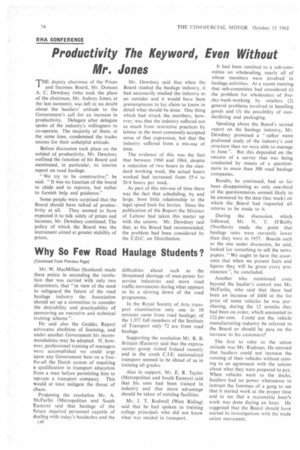THE deputy chairman of the Prices
Page 76

If you've noticed an error in this article please click here to report it so we can fix it.
and Incomes Board, Mr. Duncan A. C. Dewdney (who took the place of the chairman, Mr. Aubrey Jones, at the last moment), was left in no doubt about the hauliers' attitude to the Government's call for an increase in productivity. Delegate after delegate spoke of the industry's willingness to co-operate. The majority of them, at the same time, condemned the trades unions for their unhelpful attitude.
Before discussion took place on the subject of productivity, Mr. Dewdney outlined the function of his Board and mentioned, in particular, its interim report on road haulage.
"We try to be constructive," he said. "It was no function of the board to chide and to reprove, but rather to furnish help and guidance."
Some people were surprised that the Board should have talked of productivity at all. They seemed to have expected it to talk solely of prices and incomes, Mr. Dewdney continued. The policy of which the Board was the instrument aimed at greater stability of prices. Mr. Dewdney said that when the Board studied the haulage industry, it had necessarily studied the industry as an outsider and it would have been presumptuous to lay claim to know in detail what should be done. One thing which had struck the members, however, was that the industry suffered not so much from restrictive practices by labour in the most commonly-accepted sense of that expression, but that the industry suffered from a mis-use of time.
The evidence of this was the fact that between 1960 and 1964. despite a reduction of two hours in the standard working week, the actual hours worked had increased from 55-4 to 56.4 hours per week.
As part of this mis-use of time there was the fact that scheduling, by and large, bore little relationship to the legal speed limit for lorries. Since the publication of the Report the Minister of Labour had taken this matter up with the unions. Mr. Dewdney said that, as his Board had recommended, the problem had been considered by the E.D.C. on Distribution. It had been remitted to a sub-committee on wholesaling, nearly all of whose members were involved in haulage activities. At a recent meeting that sub-committee had considered (i) the problem for wholesalers of fiveday-week-working by retailers (2) general problems involved in handling goods and (3) the possibility of standardizing and packaging.
Speaking about the Board's second report on the haulage industry, Mr. Dewdney promised a " rather more profound study of the industry's cost structure than we were able to manage in June ". But this depended on the success of a survey that was being conducted by means of a questionnaire to more than 300 road haulage companies.
Results, he continued, had so far been disappointing as only one-third of the questionnaires seemed likely to be answered by the date (last week) on which the Board had requested all returns to be made to it.
During the discussion which followed, Mr. N. T. O'Reilly (Northern) made the point that haulage rates were currently lower than they were in 1957. Boards such as the one under discussion, he said, looked for something to sell the newspapers. "We ought to have the assurance that when we present facts and figures they will be given every prominence ", he concluded.
Another who mentioned costs beyond the haulier's control was Mr. McFarlin, who said that there had been an increase of £600 in the list price of some vehicles he was purchasing, during the 12 months they had been on order, which amounted to 12+ per cent. Could not the vehicle manufacturing industry be referred to the Board or should he pass on the increase to his customers?
The first to refer to the union attitude was Mr. Rudman. He stressed that hauliers could not increase the running of their vehicles without coming to an agreement with the unions about what they were prepared to pay. When vehicles went to the docks, hauliers had no power whatsoever to instruct the foreman of a gang to see that it started work at the proper time and to see that a reasonable hour's work was done during an hour. He suggested that the Board should have started its investigations with the trade union movement.








































































































































